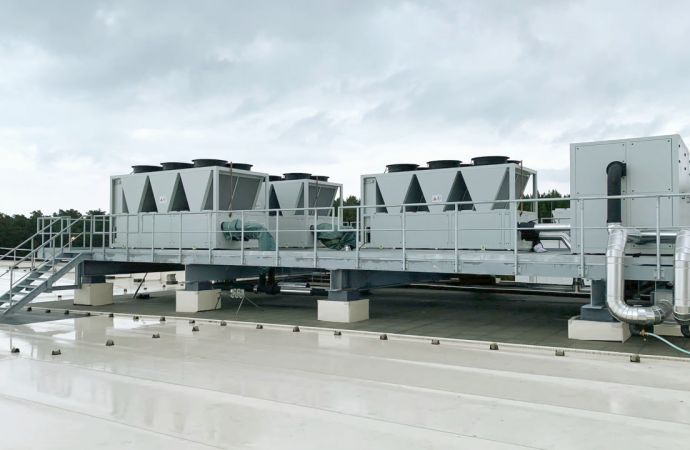As the South American country prepares to meet its Kigali Amendment commitments, one official has doubts about the future of R32 for air conditioning.

As Argentina prepares to honor its commitment to the Kigali Amendment, it is considering both propane (R290) and R32 for room air conditioning, though the latter is viewed skeptically by at least one government official.
The South American country’s possible approach to the AC sector was the subject of a webinar on November 18, “Climate-friendly, low-GWP refrigerants for room air conditioning.” It was organized by the Ministry of Environment and Sustainable Development of Argentina and by UNIDO (the United Nations Industrial Development Organization) to collect information for policymakers.
Due to Argentina’s geographic location and the estimated increase of global temperatures, Argentina has identified the swift growth of the AC sector (especially domestic appliances) as one of the drivers of the consumption of worrisome HFCs. For these reasons, the sector has been identified as one of the possible targets of the country’s first efforts to comply with its reduction commitments under Kigali.
Both R290 and R32 were discussed in the webinar, but Laura Berón, the Coordinator of the Ozone Office at the Ministry of Environment and Sustainable Development, was skeptical about R32.
“I personally have a doubt on the conversion to R32, which is currently planned to be deployed in some countries,” she said. “This would be a promotion of a refrigerant of mid-value GWP.”
Thus Argentina’s big concern is “for how long” R32 would be considered a suitable AC refrigerant,” Berón said. “R32 is anyhow one of the substances that is to be eliminated” to achieve ultimate HFC-reduction goals.
By contrast, R290 would not face any future restrictions. Argentina has been gaining experience in the use of R290 and other natural refrigerants. In 2015, Berón said, 25.6% of alternatives to ozone-depleting substances in all sectors already comprised hydrocarbons, CO2 (R744), ammonia/NH3 (R717) and methylene chloride (R30).
As a developing country, Argentina, which ratified the Kigali Amendment in 2019, is obliged by the treaty to freeze production and consumption of HFCs at baseline levels in 2024 and reduce them by 10% in 2029, 50% in 2040 and 80% in 2045. Argentina is the sixth Latin American nation to ratify Kigali, following Chile, Ecuador, Paraguay, Peru and Uruguay.
Berón underlined that the AC sector in Argentina has been converting from HCFCs to HFCs since 2013, a transition that has been “difficult and demanding for Argentinian companies.”
Midea’s R290 ACs
At the webinar, Tixun Li, a representative of Chinese OEM Midea, presented the company’s portfolio of R290-based air-conditioning systems (portable and split), highlighting the products’ UNIDO award received in 2020 and their German Blue Angel Certification from 2018.
In China, Midea has the largest percentage of cumulative unit sales of R290 split-room air conditioners, which among all manufacturers totaled more than 270,000 units at the end of November, according to Chinese authorities. Midea has received UNIDO’s support since the company began adopting R290 AC in 2014.
Midea’s R290 ACs are expected to become more widely available in Europe in 2022.
According to Li, Midea system’s R290 compressors are 4% more efficient than an R32 compressor. Midea’s R290 ACs also work with R290-compatible oil, highly efficient exchangers, safe electronic control solutions and a leak-proof indoor unit.
Midea received the Blue Angel certification from the German Environmental Agency for its All Easy Series, with 2.6 kW (0.7 TR) and 3.5 kW (1.0 TR) of cooling capacity, charged with 380g (13.4oz) of R290. These models by Midea are the only air conditioners to date with Blue Angel certification.
Also at the webinar, Daniel Colbourne, Manager of U.K. consultancy Re-phridge, addressed the perceived safety issues associated with hydrocarbons in cooling systems and the “outdated” safety standards hindering their development. He noted that different working groups are targeting these standards in an effort to update them.
Referring to a 2014 study, Colbourne pointed to the extremely low flammability risk of hydrocarbon-based split ACs, which is even lower than that of ubiquitous hydrocarbon-based domestic refrigerators.
Colbourne also cast doubt on the future viability of R32, which he pointed out has a 20-year GWP of 2,530 (and a 100-year GWP of 704). “Be aware, most HFCs have got a limited future if we look at the progression over the past few years: R22 to R410a, then R32 and then R what?,” he said. “To me it makes a lot more sense to just use a refrigerant that is effectively future-proof.”
Want to find out more, or have something to say about this story? Join the ATMO Connect network to meet and engage with like-minded stakeholders in the clean cooling and natural refrigerant arena.
Related stories



